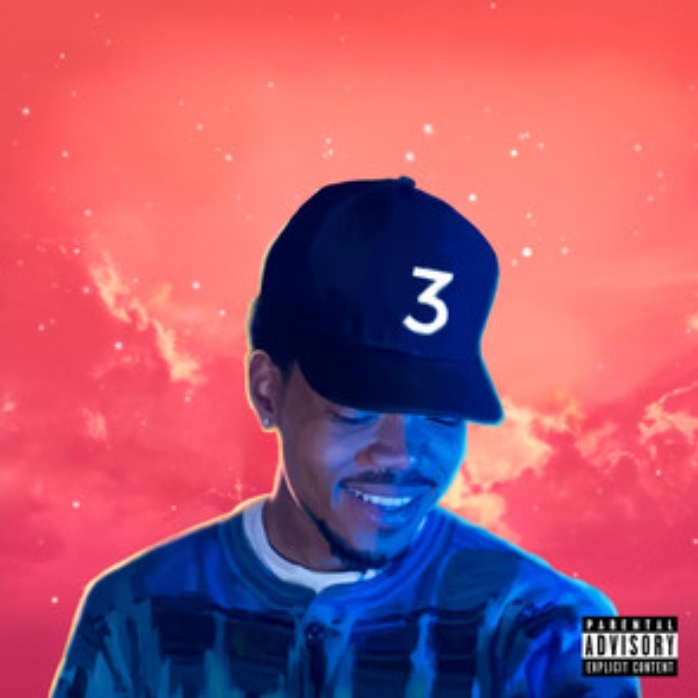
Coloring Book, Chance the Rapper’s latest album, released last May.
By Ethan McAlpin| gargoyle@flagler.edu
Now that the hype and allure of the Grammy Awards have settled, let’s reassess why so much attention was given to Chicago native and independent hip-hop artist Chance the Rapper.
The world watched on TVs, live Facebook streams, and Snapchat stories as Chance the Rapper, the independent artist who sells his music for free, blessed the stage with his presence four times. Once to perform, three times to receive a Grammy.
You may be wondering how the terms “independent artist,” “Grammy award winner,” and “sells for free” can all simultaneously describe an artist. It’s a description that Chance has been pushing for years now, finally becoming the first solely streaming, independent artist to win a Grammy. Or two. Or three.
Not only is he an independent artist, but Chance is also the first artist to win a Grammy without selling a single song. That’s right. Chance the Rapper’s music is free—all of it—to everyone. Never in his career has he sold a song for profit.
So if he’s never sold a song, how on Earth has he gotten so much success?
The answer? He’s different.
Chance began his career in high school, giving away CD’s of his early mixtapes on the street corners… for free.
Up until Chance spoke up about it, “unqualified” pieces of work, such as his previous mixtapes, were ineligible to win a Grammy. He rapped a line about the ban that garnered a lot attention in his feature on Ultralight Beam on Kanye West’s album The Life of Pablo, which released last spring — He said lets do a good a** job with Chance three / I hear you gotta sell it to snatch the Grammy / Let’s make it so free and the bars so hard / That there ain’t one gosh darn part you can’t tweet.
Now, that’s changed, and it’s all thanks to Chance—though he might say he had a little help.
Chance isn’t shy about praising God. After winning the award for the Best Rap Album of the year, he said “I want to thank God for everything that He’s accomplished for me, for everything that He’s [been] through with me.”
Unlike many Grammy-winning artists, who typically keep their faith and their music in separate spheres, Chance makes his faith profoundly known in his music. His music provides comfort and mixes in life lessons over a mix of soothing, upbeat hip-hop and Gospel-inspired tracks.
In Chance’s “Blessings,” from his first official album Coloring Book (which is still sold on iTunes for free), he raps — I’m feeling shortness of breath, so Nico grab you a horn / Hit Jericho with a buzzer beater to end a quarter / Watch brick and mortar fall like dripping water, ugh!
Alluding to Joshua 6 from the Old Testament in the Bible, Chance references the Battle of Jericho, in which, simplistically, the Israelites blew their trumpets to knock down the walls of Jericho. According to genius.com, Chance makes this Biblical reference to “describe the struggles one encounters in life. Similar to how Israelites’ faith was strong enough to break the walls down, if you work hard enough and have faith in yourself and The Lord, then everything will become possible.”
After winning the award for Best New Artist, Chance said, “Glory be to God. I claim this victory in the name of the Lord. I want to thank God for my Mother and my Father who have supported me since I was young […] I know that independence means you do it by yourself, but independence means freedom.”
Also from “Blessings,” Chance raps — I don’t make songs for free, I make ‘em for freedom / Don’t believe in kings, believe in the Kingdom.
It’s evident that Chance has a strong relationship with God, as do many musicians like him. What’s different, though, is how he chooses to share that relationship with others through his music.
As stated previously, Chance sells his music for free. Always has—and I think it’s safe to say with his success thus far—always will. His independence and loyalty to himself and those around him is what truly has allowed him to strive and prosper.
In an upbeat song titled “Angels,” Chance speaks on his popularity while remaining an independent artist, refusing to sign his rights away to a record label, though many have desperately tried to sign him.
In the verse, he raps, “… every DJ still play me though / Damn man, I don’t even need a radio.”
Discussing his internet-based success, primarily through his Soundcloud profile, Chance acknowledges that even without signing a record deal, he’s done what many others haven’t: be played on the radio frequently, win a Grammy and while remaining an independent artist.
So a new question is now written: Is Chance his own breed of an innovative, faithful artist, or is he just the beginning, paving the way for new artists to have a better chance at success?



Be the first to comment on "Is success only by chance?"